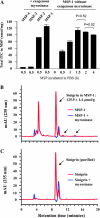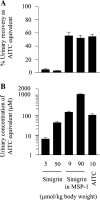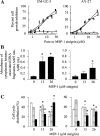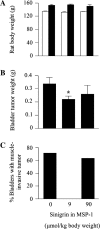Allyl isothiocyanate-rich mustard seed powder inhibits bladder cancer growth and muscle invasion
- PMID: 20889681
- PMCID: PMC3105588
- DOI: 10.1093/carcin/bgq202
Allyl isothiocyanate-rich mustard seed powder inhibits bladder cancer growth and muscle invasion
Abstract
Allyl isothiocyanate (AITC), which occurs in many common cruciferous vegetables, was recently shown to be selectively delivered to bladder cancer tissues through urinary excretion and to inhibit bladder cancer development in rats. The present investigation was designed to test the hypothesis that AITC-containing cruciferous vegetables also inhibit bladder cancer development. We focused on an AITC-rich mustard seed powder (MSP-1). AITC was stably stored as its glucosinolate precursor (sinigrin) in MSP-1. Upon addition of water, however, sinigrin was readily hydrolyzed by the accompanying endogenous myrosinase. This myrosinase was also required for full conversion of sinigrin to AITC in vivo, but the matrix of MSP-1 had no effect on AITC bioavailability. Sinigrin itself was not bioactive, whereas hydrated MSP-1 caused apoptosis and G(2)/M phase arrest in bladder cancer cell lines in vitro. Comparison between hydrated MSP-1 and pure sinigrin with added myrosinase suggested that the anticancer effect of MSP-1 was derived principally, if not entirely, from the AITC generated from sinigrin. In an orthotopic rat bladder cancer model, oral MSP-1 at 71.5 mg/kg (sinigrin dose of 9 μmol/kg) inhibited bladder cancer growth by 34.5% (P < 0.05) and blocked muscle invasion by 100%. Moreover, the anticancer activity was associated with significant modulation of key cancer therapeutic targets, including vascular endothelial growth factor, cyclin B1 and caspase 3. On an equimolar basis, the anticancer activity of AITC delivered as MSP-1 appears to be more robust than that of pure AITC. MSP-1 is thus an attractive delivery vehicle for AITC and it strongly inhibits bladder cancer development and progression.
Figures





Similar articles
-
The principal urinary metabolite of allyl isothiocyanate, N-acetyl-S-(N-allylthiocarbamoyl)cysteine, inhibits the growth and muscle invasion of bladder cancer.Carcinogenesis. 2012 Feb;33(2):394-8. doi: 10.1093/carcin/bgr283. Epub 2011 Nov 30. Carcinogenesis. 2012. PMID: 22131350 Free PMC article.
-
Inhibition of bladder cancer cell proliferation by allyl isothiocyanate (mustard essential oil).Mutat Res. 2015 Jan;771:29-35. doi: 10.1016/j.mrfmmm.2014.11.004. Epub 2014 Dec 11. Mutat Res. 2015. PMID: 25771977
-
Inhibition of bladder cancer development by allyl isothiocyanate.Carcinogenesis. 2010 Feb;31(2):281-6. doi: 10.1093/carcin/bgp303. Epub 2009 Dec 2. Carcinogenesis. 2010. PMID: 19955395 Free PMC article.
-
Anticancer Activity, Mechanism, and Delivery of Allyl Isothiocyanate.Bioengineering (Basel). 2022 Sep 14;9(9):470. doi: 10.3390/bioengineering9090470. Bioengineering (Basel). 2022. PMID: 36135016 Free PMC article. Review.
-
Allyl isothiocyanate as a cancer chemopreventive phytochemical.Mol Nutr Food Res. 2010 Jan;54(1):127-35. doi: 10.1002/mnfr.200900323. Mol Nutr Food Res. 2010. PMID: 19960458 Free PMC article. Review.
Cited by
-
Eradication of Myrosinase-Tethered Cancer Cells by Allyl Isothiocyanate Derived from Enzymatic Hydrolysis of Sinigrin.Pharmaceutics. 2022 Jan 7;14(1):144. doi: 10.3390/pharmaceutics14010144. Pharmaceutics. 2022. PMID: 35057038 Free PMC article.
-
Mustard Seed (Brassica nigra) Extract Exhibits Antiproliferative Effect against Human Lung Cancer Cells through Differential Regulation of Apoptosis, Cell Cycle, Migration, and Invasion.Molecules. 2020 Apr 29;25(9):2069. doi: 10.3390/molecules25092069. Molecules. 2020. PMID: 32365503 Free PMC article.
-
The principal urinary metabolite of allyl isothiocyanate, N-acetyl-S-(N-allylthiocarbamoyl)cysteine, inhibits the growth and muscle invasion of bladder cancer.Carcinogenesis. 2012 Feb;33(2):394-8. doi: 10.1093/carcin/bgr283. Epub 2011 Nov 30. Carcinogenesis. 2012. PMID: 22131350 Free PMC article.
-
BMI Is Associated With Increased Plasma and Urine Appearance of Glucosinolate Metabolites After Consumption of Cooked Broccoli.Front Nutr. 2020 Sep 24;7:575092. doi: 10.3389/fnut.2020.575092. eCollection 2020. Front Nutr. 2020. PMID: 33072799 Free PMC article.
-
Cruciferous vegetables, isothiocyanates, and prevention of bladder cancer.Curr Pharmacol Rep. 2015 Aug;1(4):272-282. doi: 10.1007/s40495-015-0024-z. Curr Pharmacol Rep. 2015. PMID: 26273545 Free PMC article.
References
-
- Pow-Sang JM, et al. Contemporary management of superficial bladder cancer. Cancer Control. 2000;7:335–339. - PubMed
-
- Amling CL. Diagnosis and management of superficial bladder cancer. Curr. Probl. Cancer. 2001;25:219–278. - PubMed
-
- Gagandeep, et al. Chemopreventive effects of mustard (Brassica compestris) on chemically induced tumorigenesis in murine forestomach and uterine cervix. Hum. Exp. Toxicol. 2005;24:303–312. - PubMed
Publication types
MeSH terms
Substances
Grants and funding
LinkOut - more resources
Full Text Sources
Other Literature Sources
Medical
Research Materials

